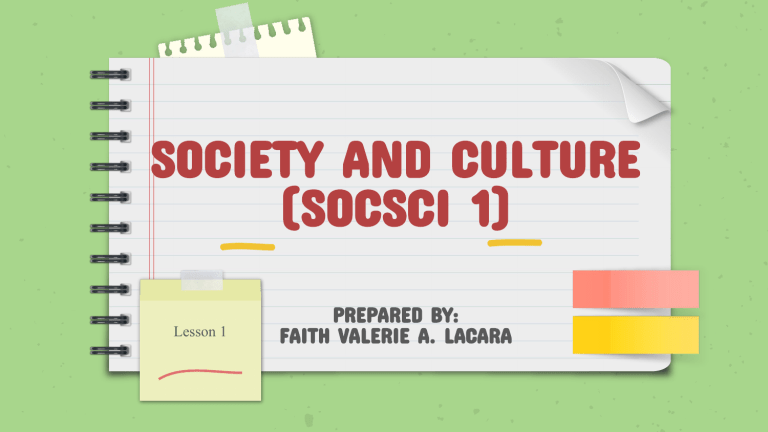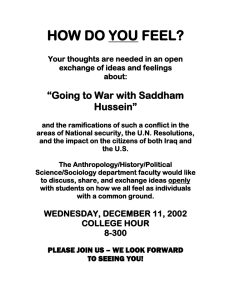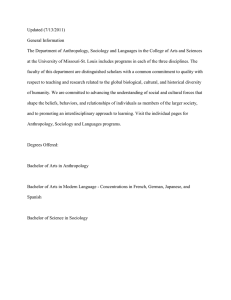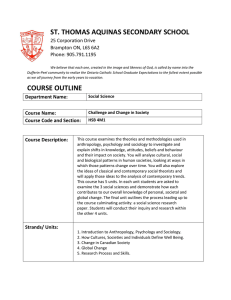
SOCIETY AND CULTURE (SOCSCI 1) Lesson 1 PREPARED BY: FAITH VALERIE A. LACARA What is Science? 01 Science is a way of learning about the world through discipline inquiry which combines systematic theory and observation that provide explanation of how the things work. Science may also be divided into: ● Pure Science is a category of science that deals with research and theories. ● Applied Science is directed toward the use of scientific knowledge and theory for the solution of practical problems. PURE SCIENCE APPLIED SCIENCE The Origins of Anthropology and Sociology ▪ ▪ From the Greek word Anthropos (tao) + logos (salita) Anthropology is also called Aghamtao Four Branches of Anthropology 1. Biological Anthropology 2. Cultural Anthropology 3. Linguistic Anthropology 4. Archeological Anthropology How did Sociology Begin? Sociology emerged in the middle of 19th century in Europe. ● ● ▪ ▪ Industrial Revolution The Success of American and French Revolution Imperialism Success of Natural Sciences INDU STRIA L REVO LUTIO N What was the Industrial Revolution? The Industrial Revolution refers to the greatly increased output of machine made goods that began in England in the 1700s. ▪ Machines were invented which replaced human labor. ▪ New energy sources were developed to power the new machinery – water, steam, electricity, oil (gas, kerosene) ▪ Increased use of metals and minerals like aluminum, coal, copper, iron, etc. The Social Class Changes ▪ The Wealthy Elite (upper class) 5 percent of the population is made up of wealthy elite. Made up of Aristocracy and Upper Middle Class who became leaders in government and military. ▪ The industrial Middle Class (Middle Class) They extended their range of fine silk clothes and comfortable furniture and ran factories with cheap labour from the working class. ▪ Working Class (Lower Class) Composed of 80 percent of the society, the workers. The S ucce ss of Amer ican Frenc and Revol h ution American Revolution 1. 2. 3. 4. 5. Navigation Act Quartering Act Stamp Act Townshend Act Revolution French Revolution TRAV E (Imp eriali L sm) IMPERIALISM By expanding their conquered countries they were also able to share their culture with them. When it comes to development, European countries have also made a significant contribution to the development of the countries under their control. The S ucce ss of Na tural Scien ce The Success of Natural Science The use of accurate valid, and systematic observations to evaluate hypotheses in chemistry and physics has started to change the world. PIONEERS OF SOCIOLOGY Auguste Comte (1798-1857) The Father of Sociology Positivism- Using Scientific methods of reveal laws by which societies and individuals interact. Harriet Martineau (1802-1876) ● Firs woman sociologist ● Illustrations of Political Economy (1931) that educated people about principles of economics. ● Credited with the first systematic methodological international comparisons of social institutions. KARL MARX (1818-1883) ▪ German Philosopher and Economist ▪ Communist Manifesto (1848)- Looks at the society as a result of the struggle of different classes over the means of production. Herbert Spencer (1820-1903) • The Study of Sociology (1873) • He favored a form that allowed market forces to control capitalism. George Simmel (1858-1918) ● Addressed topics such as social conflict, the function of money individual identity in the city life, and the European fears of outsiders. ● Micro-level theories ● Cultures are the creative capacities of individuals. Emile Durkheim (1858-1917) ● Helped Establish the first European department of Sociology at the University of Bordeaux in 1895. ● “Social facts determine whether the society is healthy or pathological.” ● Suicide are caused by socio-religious forces rather than to individual or psychological causes. George Herbert Mead (1863-1931) and the Social Self ● ● The mind and self develop as a result of social processes. How an individual views himself is based to a very large extent on interactions with others. Symbolic-interactionism and the micro-level approach. Max Weber(1864-1920) and Verstehen ● Verstehen- to grasp by insight; to understand in a deeper way; understanding from the insider’s point of view. ● Proposed the philosophy of anti-positivism whereby social researchers strive to subjectively represent social processes, cultural norms and social values. C. Wright Mills (1916-1962) and Sociological Imagination ● Sociological ImaginationSeeing general in the particular and seeing the strange in the familiar. ● Author of The Power of Life. Sociology - - Is the science of society and the social interaction taking place among individuals in a social group. Its scope is social facts such as facts in religion, law, moral ideas, and economics which must be seen in their relation to each other and the collective milieu in the midst of which they develop and whose expression they are. AREAS OF SOCIOLOGY Social Organization Human Ecology Social Psychology Sociological Theory and Methods Social change and disorganization Population studies Applied Sociology




